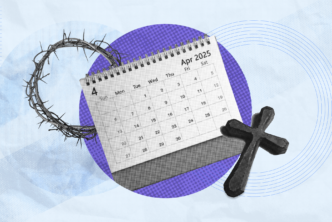If you search your Bible for the phrase “Bible study,” you won’t find it.
A big part of the problem is that the word “Bible” never occurs in most English Bibles. Even if you search for just the word “study,” you won’t find quite what you’re looking for.
Some of the returnees from exile “study” the Law of Moses (Ezra 7:10; Neh 8:13). That’s a promising start.
But people are also “studying” God’s works (Ps 111:2), “studying” various proverbs (Eccl 12:9), and “studying” Jewish traditions (John 7:15). And one of the most direct statements about study in Scripture is not encouraging: “much study is a weariness of the flesh” (Eccl 12:12).
And yet Christians talk about “Bible study” all the time. Why is that?
This article will cover:
What is Bible study?
Bible study is the practice of examining God’s Word in order to understand it and be changed by it. Christians do this because they trust what God himself says about his Word, including:
- God spoke it, so all of it is profitable (2 Tim 3:16; 2 Pet 1:21)
- It will succeed in accomplishing God’s purposes (Isa 55:10–11)
- It is perfect and right, offering great reward to those who keep it (Ps 19:7–11)
- It is true, leading us to find refuge in God himself (Prov 30:5)
- It bears witness to Jesus (Luke 24:44; John 1:45, 5:39; 1 Pet 1:10–12)
- It illuminates the path God’s people ought to walk (Ps 119:105)
Bible study includes Bible reading, but it involves much more than reading.
When we read the Bible, we gather the raw materials we need for further study. Reading the Bible at length helps us to grasp the big picture, including themes, arguments, facts, and figures. I have formed an annual habit of reading the entire Bible as quickly as possible beginning on New Year’s Day. This practice reminds me of the Bible’s overarching story, fostering my delight in the masterpiece of God’s word.
I have formed an annual habit of reading the entire Bible as quickly as possible beginning on New Year’s Day.
Though extensive Bible reading comes with many benefits, its downside is the lack of thoroughness or reflection.
Enter Bible study. Through it, we make space for close examination of the text, ensuring proper understanding. Some have used the Bible to support such beliefs as the non-deity of Jesus and the non-personhood of the Holy Spirit. Careful study allows us to perceive misuse of the text, hear the true voice of God, and live by it.
What’s the difference between Bible study and a Bible study?
People use the phrase “Bible study” in a variety of ways.
- Some use it to refer to an educational and devotional practice: “My Bible study is not as consistent as I’d prefer. Yet I’m still encouraged by all that God is teaching me.”
- Some use it to refer to a group of people meeting together for teaching or discussion: “My Bible study is friendly and welcoming. We’d love to have you join us Tuesday nights!”
- Some use it to refer to a written curriculum or published guidebook: “My Bible study has been especially relevant over the last few weeks. I’m amazed at how each lesson has connected with what God is doing in my life.”
Small groups studying the Bible together (usage #2) can help each person develop personal Bible study skills (usage #1). As can pre-written study guides (usage #3). Together, they can all be part of a plan to equip your church for serious Bible study.
The rest of this article will focus on usage #1, the personal, educational, and devotional practice of Bible study. To get your bearings, consider this video with twelve big-picture facts about how the Bible came to be.
What are the purposes of Bible study?
Why do people study the Bible? Why do you study the Bible?
Each person who studies the Bible may be motivated by different reasons:
- To understand the Christian faith
- To understand what God has communicated to us
- To live faithfully as a Christian
- To delight in the kingdom and Word of God
As a child, I studied the Bible so I could win at Bible trivia in Sunday school. As my aspirations matured, so did my awareness of why Christians ought to study the Bible. I remember noticing that Peter’s mountaintop experience of Jesus’s transfiguration confirmed not only Jesus’s identity (Luke 9:35) but also the authority of Scripture (2 Pet 1:16–21). Isn’t that striking? Peter never tells us to seek mountaintop experiences with Jesus. His mountaintop experience only confirms our need to pay attention to the prophetic Word.
But why? Why must we pay attention to that Word?
Because if we don’t, we will drift away from what we’ve heard (Heb 2:1–4). We’ll drift away from our confession of Christ (Heb 10:23). We may fail to obtain the grace of God (Heb 12:15). As mentioned above, the entire Bible is about Jesus (Luke 24:44; John 1:45, 5:39; 1 Pet 1:10–12). And now we see that neglecting the Bible may lead us to drift away from Jesus.
For these reasons, the chief goal of studying the Bible is to meet with Jesus, to know him. And by knowing him, we come to know the Father (John 14:9).
This is precisely the way Paul thought about the Scripture.
Now when they had passed through Amphipolis and Apollonia, they came to Thessalonica, where there was a synagogue of the Jews. And Paul went in, as was his custom, and on three Sabbath days he reasoned with them from the Scriptures, explaining and proving that it was necessary for the Christ to suffer and to rise from the dead, and saying, “This Jesus, whom I proclaim to you, is the Christ.” And some of them were persuaded and joined Paul and Silas. (Acts 17:1–4 ESV)
On his missionary journeys, Paul sought to lead people into the faith, into a relationship with the true God. To do so, he knew he had to introduce them to Jesus. And in order to do that, he had to show them the Scripture. He had to study the Bible with them.
Therefore, the chief purpose for studying the Bible is to know God through his Son, Jesus Christ.
Would you like to learn how?
What is a Bible study method?
A Bible study method is a process to help you analyze the text. A simple method will be easier to remember and follow than a complex one. Granted, the details of your study will get complex, but your method doesn’t have to.
Are you turned off by the idea of having a “method” for your Bible study? Does it sound too impersonal or academic? If the chief purpose of Bible study is to know God through his Son, aren’t you better off without a method?
Believe it or not, everyone has a Bible study method. You can’t choose to not have a method. All you can choose is whether your method is a good one.
For example, someone who claims to have no method might do the following:
- Ask God for wisdom in a difficult situation.
- Wait to hear an inner voice suggest a passage of the Bible to read.
- Read that passage through the lens of your difficult situation.
Here’s another informal method a person could use:
- Ask the Holy Spirit to guide you to a passage that speaks to your life.
- Flip the pages of your Bible and drop your finger at a random spot.
- Read the verse you’re pointing to.
- Reflect on how to obey the verse you just read.
And here’s one more:
- Read a Bible passage. (Perhaps you’re working through a book, and this is simply the next passage.)
- Close your eyes, and possibly your Bible as well.
- Consider what this text means to you and how you might put it into practice.
Everyone who studies the Bible has a method for their study. The question is not whether you have a method but whether you have a good one.
How to study the Bible
Before I get to the practical steps of a robust Bible study method, let me cover some environmental factors.
1. Find a time when you can focus
Many people enjoy doing Bible study first thing in the morning, but that’s not a requirement. The most important factor is to find a time when you have the margin and energy for the task.
2. Find a space where you can focus
When training yourself in good Bible study skills, you’re developing a habit. Designate a desk or table, or perhaps a couch or café, where you can regularly return. (Although, if you have children, you may want to locate your study space in full sight of your children. That way they can see your example and imitate it themselves.)
3. Keep a blank notepad handy
You might want a notepad for your study notes, but that’s not what I’m referring to here. As you study God’s Word, other things will come to mind. To-dos, emails, letters to write, and people to connect with. If you have a blank notepad handy, you can write those things down so you won’t forget them or be distracted by them. A notepad will allow you to set your to-dos aside until you finish your Bible study.
4. Focus on the Bible
Remember, you’re here to study the Bible. You’re not here to study websites or commentaries. You’re not here to study a book on Christian living. Those are all good things to do, but they are not the same as studying the Bible. Develop in yourself a comfort with God’s Word. You can and should make time to consult other resources, but your first priority is to hear the words of your king, from his own mouth.
5. Get your bearings in the Bible
Sometimes, sitting down alone with a Bible feels like an awkward first date. What do you do? What questions should you ask? How do you move this relationship forward? So I recommend taking steps to develop your sea legs for this voyage. You’ll want to learn to find your way around this masterful collection of sixty-six books. Here is a video to help you do just that.
What are the steps of Bible study?
There are many good Bible study methods, each with its own labels and terminology (the Inductive Method, for instance). What is most important is not your terminology for Bible study but the substance of it. All good methods for Bible study will involve some combination of the following skills:
1. Pay attention to what the text says
Whether you call it observation, syntax, grammar, context, or simply “look,” you cannot study the Bible properly without paying attention to what it says. This requires us to overcome our familiarity with the text in order to scrutinize it more closely.
Did you know some of the most famous Bible verses aren’t actually in the Bible? “Money is the root of all evil.” “God helps those who help themselves.” You will not find these statements in the Bible.
Even some phrases we commonly use are not from the Bible. “The world, the flesh, and the devil.” “Be in the world but not of it.” These phrases have some biblical truth behind them. But we must learn to pay attention to what the Bible actually says. If we don’t, we lose all credibility when we try to teach it or communicate what it says to others.
This is where all the labels you learned in English class come in: noun, verb, adjective; subject, predicate, direct object, indirect object; poetry, discourse, narrative. Because the literary genres (kinds of literature—for example, history and epistle) and literary devices (such as comparison and contrast, conflict and climax) will be less familiar to you, you’ll want to have a stock of things to look for in the text.1 The point here is that you won’t observe texts well if you don’t have categories for what you see.
2. Figure out what the text means
Get yourself, as best you can, into the shoes of the original audience for your text. What did the text mean in their culture and at their time in history? How would they have heard this text? What truth(s) was the author trying to persuade them of? And what did he want them to do?
This step could be labeled interpretation, hermeneutics, or meaning. Whatever you call it, the goal is the same. Figure out the text’s message.
Not the message for yourself. That will come later. But the message for the original readers (as best as you can figure out who they were and where they lived).
This is the time when outside resources will provide extra help. Atlases, Bible dictionaries, commentaries, and book introductions in study Bibles (like this one) all have a place here.
The closer you can follow the author’s own argument in the text, the better your study will come out. If the divinely inspired author has one main point to make, with a few points in support, make those points yours. If a poetic text would have moved the original readers in a certain way, try to understand why—seek and pray to be moved the same way. If a narrative builds to a climax, the text’s message must have something to do with that high plot point.
Enjoy the literature of the Bible. Delight in it. And when you grasp the author’s intended meaning, you’ll know the Lord better through his Son, Jesus Christ.
3. Exalt Jesus
Remember, the entire Bible is about Jesus Christ. The only way to know God is to come through his Son. So any decent Bible study method will help you, in some way, to see Christ more clearly. To know him more deeply. To love him more fervently.
Old Testament texts were all looking forward to his person and work. That doesn’t mean every detail is some secret code unlocking an aspect of Jesus’s story. It means that the main ideas of every passage all touch on at least one of the following categories (see Luke 24:45–48):
- Jesus’s suffering
- Jesus’s resurrection
- The availability of forgiveness to those who repent of sin
- The proclamation of this good news to all nations
New Testament texts unpack the person and work of Jesus. Sometimes Jesus is all over a passage, and we fail to see it. For example, consider 2 Timothy 1:1–2. Just a basic greeting for a letter, right? Wrong. Look again, and find Jesus in at least three places. How does even Paul’s greeting exalt Jesus and thereby prepare Timothy for the body of the letter?
Eternal life is to know God through his Son Jesus (John 17:3). If your Bible study doesn’t help you—every time!—to know Jesus better, it has not yet prepared you for eternal life.
4. Change your life
Jesus aims to transfer people from one kingdom to another (Col 1:13). From death to life (Eph 2:1–6). From hostility to friendship (Col 1:19–23).
The primary purpose of Bible study is to help you know God through his Son, Jesus Christ.
- If you know God, you cannot return to your old thinking or your old way of doing things (Gal 4:9).
- If God knows you, he will conform you to the pattern made by his Son (Rom 8:29).
- If God has set you free, you have a new identity in him (Rom 6:17–18).
- If your faith is true, a changed life will blossom (Jas 2:14–17).
You can call this step application, ethics, doctrine, praxis, or action. But whatever you label it, the question is the same: Is your Bible study producing a changed life before God?
Now to a final two questions—one theoretical and one practical.
Is Bible study the same as biblical studies?
It isn’t exactly true to say that “Bible study” and “biblical studies” are the same thing. Bible study is an educational and devotional practice, while biblical studies tends to be more academic in nature.
But the two are related: biblical studies scholars provide all the useful tools that enable the rest of us to experience productive Bible study, especially when we run into difficult questions.
What are the tools for Bible study?
Speaking of those tools: the Logos Bible study app provides a one-stop shop with nearly all the tools you need for effective Bible study.
1. A Bible
That’s what you’re studying, right? In Logos, you can gather many good translations and mark up or annotate them in any way you like. Then you can toggle those annotations on or off, as needed. You’ll find whatever translation you prefer, or many English translations to compare side by side.
2. A notebook
You’ll want to capture notes on what you’re seeing and learning from the passage. You’ll want to record questions raised by the text. You can use paper and pen. Or in Logos, your digital notebooks will be searchable and linked to the texts you’ve studied.
3. A method
Another way to think of your method is to have a workflow. When you sit down, open your Bible and read, What will you do next? Logos has a number of workflows to assist you with your Bible study method. Here is a custom workflow I made to help you keep your focus on the text.
4. A library
You could use an atlas, a (free) Bible dictionary, a collection of commentaries, or study Bibles. Depending on how much research you expect to do, you may even want access to monographs and journals. As long as your focus is on the Bible itself, a library can provide you with exceptional support.
Just be careful not to rely on supporting resources too quickly. And don’t let them do your thinking for you. But if you don’t know who on earth the Hittites were, you’ll want to look them up. And if you think “sleeping with his fathers” means securing a spacious bunk room for vacation, a commentary will clarify the idiom.
Logos provides a nearly limitless library, customized to your personal needs and budget.
The Lord your God is eager to know his people. He’s given his Word to make it possible. The best tool at your disposal is this thing called Bible study.
Related articles
- 29 Bible Study Tools for Reading the Bible More Effectively
- 10 Grievances about Study Bibles (& Which Are Best)
- 12 Tips: How to Read the Bible Better
- Free Chronological Bible Reading Plan & How to Stay on Track
- My book Knowable Word explains five kinds of observations: literary form, words, grammar, structure, and mood.







